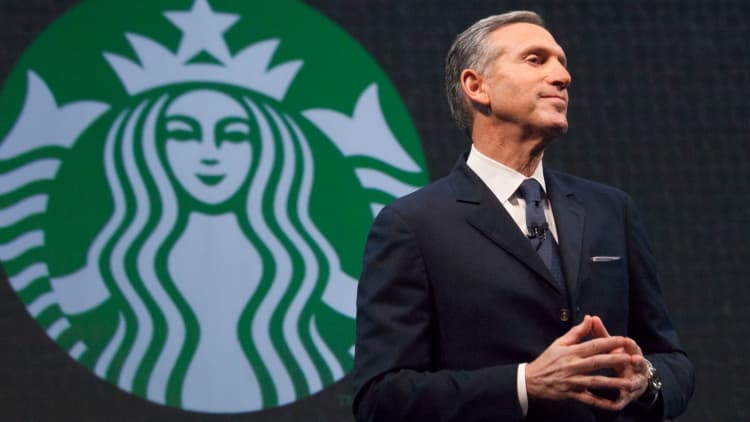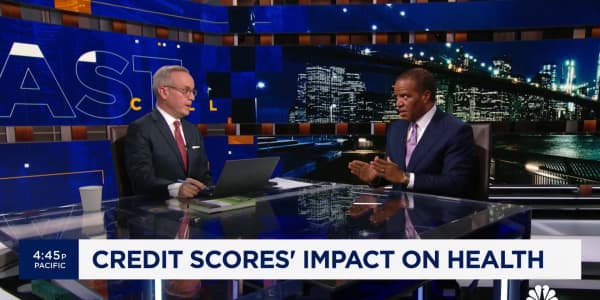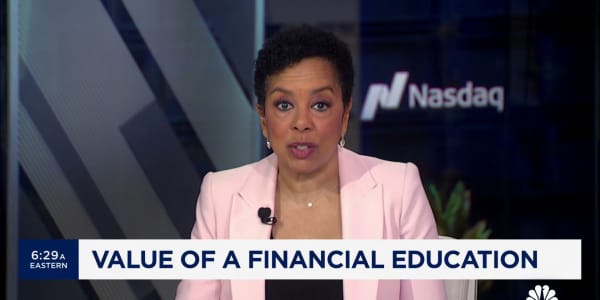If millennials are supposed to be the first generation going mostly cashless, they are making the move halfheartedly.
Millennials still rely on cash — 80 percent of millennials carry greenbacks. And 42 percent still write checks, according to the Accel + Qualtrics Millennial Study 2017.
And that could be a good thing, as some advisors say a cash diet is the best way to pare down debt.
The study corroborates other recent findings that technology is not overturning conventional ways to pay for things, even as millennials flock to mobile payment apps like Apple Pay and Venmo.
The Federal Reserve Bank of Cleveland released a study late last year showing that there were more than 17 billion checks in circulation in the U.S in 2015 with a value of more than $26 trillion, and while continuing down from previous years, the rate of decline has slowed rather than accelerated.
Digging into the truth about millennials and cash can help this generation, saddled with student debt, save money.
Sophia Bera, a millennial who founded Gen Y Planning and is a member of the CNBC Digital Financial Advisor Council, said most of her friends carry some cash, but she rarely sees them using it as the first option to pay for things. It's mostly cash for emergency situations, or cash for tips.
"When I use Venmo it feels like magical money," Bera said. "You forget that it is money, like any money, and that is bad."
The financial advisor highly recommends cash to people trying to get out of credit card debt or for sticking to a budget. "A weekly cash amount is good," Bera said. "Take out $200 every Friday and when it is gone it is gone. ... It's a lot harder to drop six twenties on a dress than swiping a card. People don't buy flatscreen TVs with $20 bills."
Bera said switching to cash, even for just a few months, can help people reign in spending, and is especially helpful for those trying to get out of debt.
It's a practice a millennial CNBC Make It reporter recently tried, with positive results.
It's a lot harder to drop 6 twenties on a dress than swiping a card. People don't buy flatscreen TVs with $20 bills.Sophia Berafounder of Gen Y Planning
"We have this image of millennials as freewheeling nomads who move around with only a smartphone and payment apps in their pockets. The reality is much different," said Mike Maughan, head of brand growth and global insights at Provo, Utah-based survey software firm Qualtrics, and himself a member of the millennial generation.
Maughan pointed to additional study data showing millennial consumer spending preferences related to technology are not occurring as quickly as commonly perceived. The Accel + Qualtrics Millennial Study found that while online shopping is a growing trend, millennials haven't given up on brick-and-mortar stores just yet. In fact, nearly half of millennials say they purchase electronics in stores and more than one-third say they still buy books in a bookstore.
"Millennials are the first always-connected generation, and it shows in more than just how they share their adventures online," Maughan said. They are three times more likely than older generations to turn to social media for advice about product purchases.
How millennials pay for things
- 80 percent use cash
- 64 percent carry cash most of the time
- 4x more millennials use cash than top mobile payment platforms
- 3x more millennials use checks than mobile payment platforms.
- 42 percent still use checks
- More millennials use cash than debit cards
- Millennials are 16x more likely to use Apple Pay or Android Pay than boomers ...
- ... And 6x more likely than boomers or GenX to use Venmo.
(Source: Accel + Qualtrics Millennial Study 2017)
Michael Diamond, general manager of payments at Mitek, which provides technology services including mobile identity verification and has 5,500 banks using its mobile deposits function, pointed to a Bain study from November in which it found millennials still calling call centers and walking into bank branches more than expected.
A suspected culprit?
"Millennials are very nervous about money," Diamond said. "They feel unsophisticated about how it works." They have embraced loyalty-based mobile payment options — and it is significant that there is now an expression 'Venmo me money,'" Diamond said.

There is another expression that Diamond thinks speaks to millennials' view of money: "I have daughters in their early 20s and they say they are 'learning how to adult.'"
He said it is still easier to understand cash, checks and debit cards. "Writing something out or taking it out of the register is something that you can understand and have control over," Diamond said.
The end of cash may not be near, but it's still coming
Other experts concede that the nature of tech disruption in the financial sector has already changed in unforeseen ways, with more new technology being adopted by big players rather than threatening them. But one trajectory that remains on a clear course is the end of cash.
Brett King, the founder and CEO of online bank Moven, said he views the data on millennial usage of checks and cash as a "false positive."
"If you're paying a landlord or school fees, you often can't pay with anything other than a check. In the UK, EU, Australia, Singapore and elsewhere most millennials simply don't use checks because there are viable alternatives," King said." Don't let the fact that the U.S. is 10 years behind markets like China lull us into a false sense of security."
"I never seen a millennial pull out a check book at Target to pay for something," Bera said.
King is confident that a major decline is coming for every form of payment other than mobile. "Millennials use mobile more than any other channel, the younger they are, the more they use mobile over other payment methods, cash included. As soon as we have viable real-time payments capabilities in the U.S., then cards, checks and cash will all see serious decline in usage."
If he is right, the next challenge for the 80 percent of millennials who still rely on cash may be trying to figure out how to budget in a truly cashless society.






